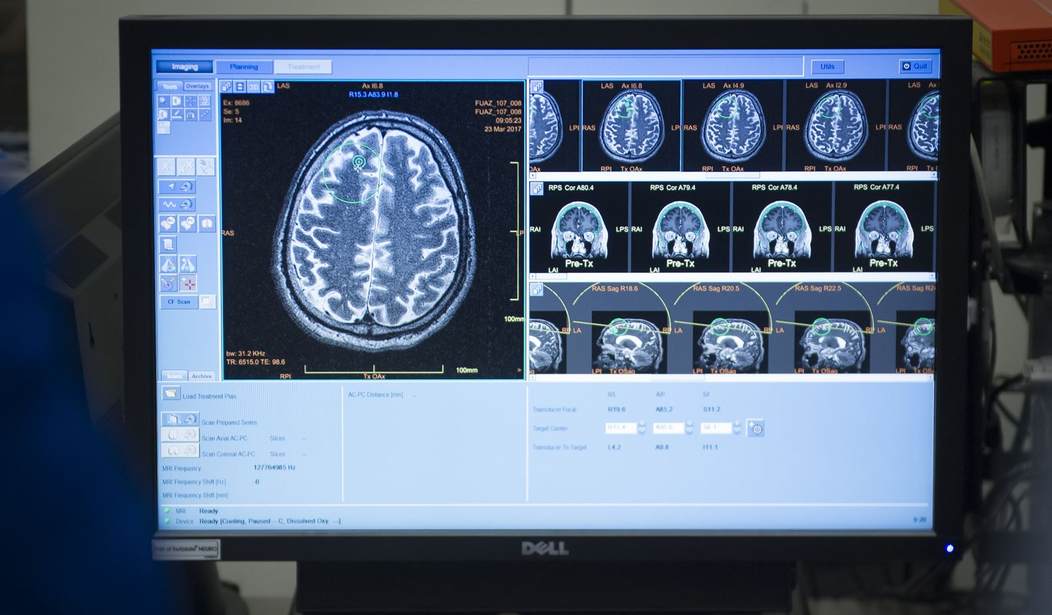An interesting new study was released this week about physical differences in the brains of people on opposite sides of the political aisle The study was actually an attempt to replicate an earlier study published in 2011.
The issue of whether political ideology could be seen in the brain was first raised in 2011, when Colin Firth, the actor, guest-edited BBC’s Today programme, and invited University College London (UCL) to scan the brains of Conservative politician Alan Duncan, and Labour’s Stephen Pound.
Pound’s scan revealed a thicker anterior cingulate cortex – an area that regulates attention, inhibitory control, error monitoring, and motivation – while Duncan’s was thinner. Both MPs recorded similar densities for the amygdala.
At the same time, UCL also tested 90 university students and found that the gray matter of the anterior cingulate cortex was significantly thicker amongst those who described themselves as liberal, or left-wing, while the amygdala was larger in those who regarded themselves as conservative or right-wing.
That made a lot of headlines at the time but that fact that only 90 subjects were involved led some experts to question the reliability of the results. In fact, the authors of the new, much larger study went into it not expecting any of the previous results to hold up. They were surprised.
“It was really a surprise that we replicated the amygdala finding,” said first author Diamantis Petropoulos Petalas in a statement, referring to a 2011 study that was widely shared after concluding that there could be a link between brain structure and political affiliation. “Quite honestly, we did not expect to replicate any of these findings.”
So what did they find? Well, one part of the earlier study dealing with the amygdala did hold up but with a much weaker level than in the 2011 study.
In agreement with the original study, the researchers found an association between conservatism and the volume of gray matter in the amygdala; however, this association was three times weaker compared to the original study.
“The amygdala controls for the perception and the understanding of threats and risk uncertainty, so it makes a lot of sense that individuals who are more sensitive towards these issues have higher needs for security, which is something that typically aligns with more conservative ideas in politics,” says Petropoulos...
“The Netherlands has a multi-party system, with different parties representing a spectrum of ideologies, and we find a very nice positive correlation between the parties’ political ideology and the amygdala size of that person,” says Petropoulos. “That speaks to the idea that we're not talking about a dichotomous representation of ideology in the brain, such as Republicans versus Democrats as in the US, but we see a more fine-grained spectrum of how political ideology can be reflected in the brain’s anatomy.
So this is probably more of a spectrum rather than an either/or thing. And it's worth noting the anatomical differences we're talking about are incredibly small.
The amygdala is about as big as a shelled peanut — and the difference between conservatives and liberals is about the size of a sesame seed, Petropoulos said.
The other finding from the 2011 study was found to be a bust by the new study.
in contrast to the original study, the team did not find any association between conservatism and a smaller volume of gray matter in the ACC, a brain region involved in error detection, impulse control, and emotional regulation.
Speaking of impulse control, there's actually another study which was published in 2020 which tried to assess why conservatives generally report being happier than liberals. The answer appeared to be greater impulse control based on increased connectivity of specific brain regions.
Conservatives have greater psychological well-being and are more satisfied with their lives than liberals despite their psychological vulnerability to stress caused by threat and anxiety sensitivities...We found that conservatives, compared to liberals and moderates, had greater psychological resilience and self-regulation capacity that were attributable to greater impulse control and causal reasoning. Stronger intrinsic connectivities between the orbitofrontal cortex (OFC) and precuneus and between the insula and frontal pole/OFC in conservatives were correlated with greater resilience and self-regulation capacity. These results suggest the neural underpinnings that may allow conservatives to manage the psychological stress and achieve greater life satisfaction.
A bit later the study points out what happens if these brain regions aren't communicating properly.
The connectivity between these regions is related to the self-processing of negative emotional distractors and mental representation29. Indeed, a disruption of the functional coupling between these regions explains dysfunctional emotional processing and the negative self-view of patients with major depression.
This is not the first time that conservatism has been connected to mental resilience while liberalism has been connected to depression. This same divide has come up in the discussion of how liberal and conservative teens deal with social media. Progressive Matt Yglesias suggested this difference was real and might be cultural.
Some of it might be selection effect, with progressive politics becoming a more congenial home for people who are miserable. But I think some of it is poor behavior by adult progressives, many of whom now valorize depressive affect as a sign of political commitment.
Jonathan Haidt said he found this idea interesting.
Like Filipovic, Yglesias, Goldberg, and Lukianoff, I think there’s something about the messages liberal girls consume that is more damaging to mental health than those consumed by other groups.
Perhaps the messages do have something to do with it, but maybe it's even more basic than that. Maybe conservative brains are just more resilient even when they get the same negative messages while progressive brains are less resilient and more prone to sliding toward unhappiness.
In any case, I think this area of study is pretty interesting. Hopefully we won't have to wait another 13 years for more research on this topic.








Join the conversation as a VIP Member